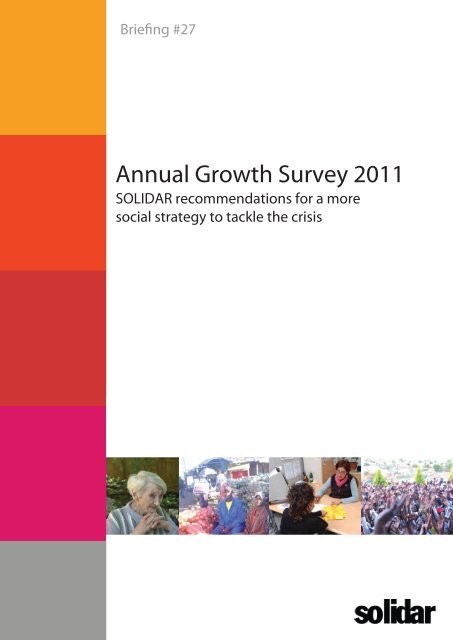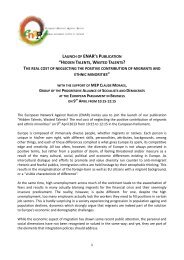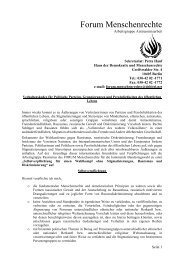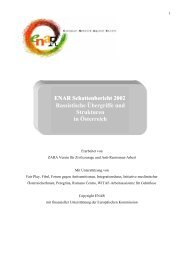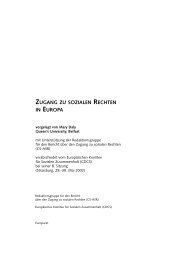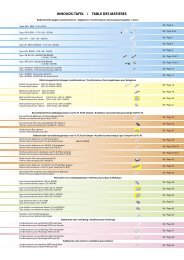Annual Growth Survey 2011 ? SOLIDAR Recommendations
Annual Growth Survey 2011 ? SOLIDAR Recommendations
Annual Growth Survey 2011 ? SOLIDAR Recommendations
You also want an ePaper? Increase the reach of your titles
YUMPU automatically turns print PDFs into web optimized ePapers that Google loves.
Brieng #27<br />
<strong>Annual</strong> <strong>Growth</strong> <strong>Survey</strong> <strong>2011</strong><br />
<strong>SOLIDAR</strong> recommendations for a more<br />
social strategy to tackle the crisis<br />
EU-level initiatives on
TABLE OF CONTENTS<br />
Foreword 2<br />
<strong>Recommendations</strong> to European decision makers 3<br />
Introduction 5<br />
General remarks 6<br />
Summary of <strong>Annual</strong> <strong>Growth</strong> <strong>Survey</strong> <strong>2011</strong> 6<br />
<strong>SOLIDAR</strong> Analysis 8<br />
Responsible Editor: Conny Reuter<br />
Authors: Adeline Otto (adeline.otto@solidar.org)/Francesco Zoia Bolzonello (infosocial@solidar.org)<br />
<strong>SOLIDAR</strong> is a European network of 52 NGOs<br />
working to advance social justice in Europe and worldwide.<br />
<strong>SOLIDAR</strong> lobbies the EU and international institutions in<br />
three primary areas: social affairs, international cooperation and education.<br />
©<br />
<strong>SOLIDAR</strong><br />
Published March <strong>2011</strong><br />
WWW.<strong>SOLIDAR</strong>.ORG
FOREWORD<br />
Over the past few months, the issue topping the headlines is what economic strategy will European<br />
countries adopt to get us out of the crisis. Two proposals are: the Competitiveness Pact (by France<br />
and Germany) and the <strong>Annual</strong> <strong>Growth</strong> <strong>Survey</strong> (by the European Commission).<br />
Both documents are looking to get Europe a competitive advantage by advocating for putting in place<br />
a more flexible labour market and wage cuts. This is a clear attempt to undermine the “social acquis”<br />
and the European Social Model. It would further undermine the welfare state and have severe<br />
consequences by increasing poverty instead of reducing it (note that the Europe 2020 Agenda instead<br />
aims to reduce poverty).<br />
We know that Europe cannot and should not compete on low wages and precarious employment. The<br />
results of such a strategy would put Europe at risk, not only in terms of economic governance, but also<br />
by undermining the Eurozone and European integration - as the approach privileges an<br />
intergovernmental instead of a community method.<br />
Instead of financial and fiscal consolidation through austerity plans, we call instead for consolidation<br />
through growth which should be smart, sustainable and inclusive. Has nothing been learnt from the<br />
crisis? The harsh austerity policies currently being implemented by governments are undermining a<br />
socially sustainable recovery and resulting in even more inequality for the poor and disadvantaged -<br />
people who <strong>SOLIDAR</strong> members work with and provide services for – paying the costs for a crisis that<br />
they did not cause.<br />
We need economic strategies to get Europe out of the crisis which:<br />
Help Member States support each other – an EU coordination in favour of an<br />
intergovernmental approach where strong members group together and bully the small.<br />
Are based on the social dimension of the Europe 2020 Strategy, and not the Competitiveness<br />
Pact and <strong>Annual</strong> <strong>Growth</strong> <strong>Survey</strong>.<br />
Use employment rates as an indicator and not just labour costs.<br />
Increase competitiveness through an increase in wages and investment in education and<br />
social infrastructure, and not just cutting wages.<br />
Includes collective bargaining by social partners at national level.<br />
Gets supplementary financial revenue through taxation (Financial Transaction Tax) and<br />
Eurobonds.<br />
Together for Social Europe!<br />
Conny Reuter<br />
<strong>SOLIDAR</strong> Secretary General
RECOMMENDATIONS TO EUROPEAN DECISION MAKERS<br />
SOCIAL INVESTMENT<br />
<strong>SOLIDAR</strong> calls for the implementation of an<br />
effective social impact assessment of the<br />
crisis. This is important not only for the<br />
national austerity plans demanded by the<br />
EU finance ministers, but also for the<br />
establishment of the next EU multi-annual<br />
financial framework. The results of this<br />
social impact assessment would have to be<br />
binding towards EU and Member States,<br />
and to be conducted in a transparent and<br />
participative way together with civil society.<br />
The social dimension of the EU 2020<br />
Strategy needs to be reinforced by<br />
supporting development policies, by<br />
stressing the need for investments to<br />
generate inclusive growth and by<br />
supporting the role of social protection as<br />
an automatic stabiliser for the economy.<br />
The EU budget, national budgets and<br />
austerity measures must comply with Article<br />
9 of the Lisbon Treaty and its “requirements<br />
linked to the promotion of a high level of<br />
employment, the guarantee of adequate<br />
social protection, the fight against social<br />
exclusion, and a high level of education,<br />
training and protection of human health”.<br />
The social policy priorities in the Europe<br />
2020 Strategy and its guidelines have to be<br />
matched with sufficient financial support for<br />
social recovery.<br />
<strong>SOLIDAR</strong> advocates for a fair redistribution<br />
of income and wealth. Mobilising massive<br />
tax-based state support to carry the<br />
banking sector, promoting strict wage<br />
moderation, cutting unemployed benefits<br />
and lessening progressive indirect taxes<br />
results in the contrary. It contributes and<br />
reinforces to an ongoing unequal<br />
redistribution of income and profits.<br />
ENSURING SOCIETAL PARTICIPATION<br />
Policies guaranteeing mechanisms of<br />
solidarity and promoting social cohesion,<br />
social inclusion as well as sustainable<br />
development are to be defended,<br />
developed and strengthened against a one-<br />
sided implementation of the Europe 2020<br />
Strategy focused only on growth and<br />
competitiveness.<br />
Although the Commission’s Joint<br />
Employment Report (Annex 3 of the <strong>Annual</strong><br />
<strong>Growth</strong> <strong>Survey</strong>) mentions the commitment<br />
to combat poverty and social exclusion and<br />
calls for a wider use of in-work benefits, for<br />
the redistribution of income towards low<br />
income families, and for a reinforcement of<br />
safety nets, this is not sufficiently reflected<br />
in the <strong>Survey</strong> itself. <strong>SOLIDAR</strong> points out<br />
that the Lisbon Treaty’s transversal clauses<br />
8,9 and 10 as well as the Europe 2020<br />
Strategy guidelines 7 (quality jobs) and 10<br />
(promoting social inclusion and combating<br />
poverty) have to be effectively<br />
implemented.<br />
“Making work more attractive” must not be<br />
realised through putting pressure on the<br />
unemployed and by lowering working<br />
standards but by promoting decent work<br />
and quality jobs. <strong>SOLIDAR</strong> calls for the<br />
“translation” of the Decent Work Agenda to<br />
European social realities. This means<br />
developing and implementing policies to<br />
fight and avoid working poor and precarious<br />
working conditions and to address aspects<br />
of labour market segmentation.<br />
Bearing in mind the discussions of the<br />
European Year 2010 and the objectives<br />
within the European Platform against<br />
Poverty, <strong>SOLIDAR</strong> recalls that aiming for<br />
the eradication of poverty and social<br />
exclusion needs special attention, focus<br />
and resources and a mid- to long-term<br />
perspective. In this context, <strong>SOLIDAR</strong><br />
emphasises that employment alone will not<br />
guarantee a route out of poverty. Ensuring<br />
social inclusion and societal participation<br />
requires more than the promotion of labour<br />
market participation. It also involves<br />
accessible, affordable and quality social<br />
services, the fight against gender<br />
inequalities and discrimination as well as<br />
poverty-proof minimum income schemes (at<br />
least 60% of the median national household<br />
equivalised income) which are accessible to<br />
3 | <strong>Annual</strong> <strong>Growth</strong> <strong>Survey</strong> <strong>2011</strong> – <strong>SOLIDAR</strong> <strong>Recommendations</strong>
all groups of people as proposed by the<br />
Belgian presidency in 2010.<br />
The Commission called for the<br />
implementation of its active inclusion<br />
recommendation of 2008 by ensuring that<br />
the Flagship Platform against Poverty gives<br />
priority to developing a concrete roadmap<br />
for implementation.<br />
TRANSLATING DECENT WORK AGENDA TO<br />
EUROPEAN SOCIAL REALITIES<br />
The financial and economic crisis<br />
deteriorated the living and working<br />
conditions of many people. In this<br />
context <strong>SOLIDAR</strong> advocates more than<br />
ever for a European Social Model based<br />
on sustainable economic performance, a<br />
high level of social protection and<br />
education, and social dialogue to<br />
become the reference frame for the<br />
Europe 2020 Strategy.<br />
For <strong>SOLIDAR</strong>, labour law is about<br />
effectively promoting individual and<br />
collective rights. <strong>SOLIDAR</strong> supports<br />
flexicurity policies if designed in a way<br />
not to increase insecurity or precarious<br />
conditions for more vulnerable groups in<br />
relation to the labour market.<br />
When tapping into the potential of the<br />
single market, the Commission refers to<br />
removing unjustified restrictions on the<br />
retail industry such as disproportional<br />
limitations on opening hours and zoning.<br />
“Disproportional” should not entail<br />
having long-working hours, night shifts<br />
or extra-opening during holidays<br />
because of fierce competition market<br />
logic.<br />
To enhance labour market inclusion for<br />
the more vulnerable, <strong>SOLIDAR</strong> calls for<br />
the merger of Public Employment<br />
Services and unemployment insurance<br />
services, to create "one-stop" shops<br />
avoiding double work (double data<br />
collection, interviewing, action planning)<br />
and reducing interface management<br />
between organisations.<br />
As the Commission underlines the<br />
importance of “white jobs”, <strong>SOLIDAR</strong><br />
stresses that it is economically relevant<br />
to invest in social services, considering<br />
that the demand for these services<br />
already exceeds the supply of resources<br />
available.<br />
ENHANCING THE PARTNERSHIP PRINCIPLE<br />
Engaging social partners and civil<br />
society organisations throughout the<br />
entire process.<br />
Reinforcing the social dimension of the<br />
Europe 2020 Strategy, through the<br />
education, employment and poverty<br />
targets, as well as through Guidelines 7<br />
and 10, and the flagship initiatives on<br />
youth, poverty and new skills for new<br />
jobs, can be achieved by embedding<br />
effective monitoring and follow-up built<br />
on existing social indicators, as<br />
developed by the Open Method of<br />
Coordination (OMC) on social protection<br />
and social inclusion.<br />
4 | <strong>Annual</strong> <strong>Growth</strong> <strong>Survey</strong> <strong>2011</strong> – <strong>SOLIDAR</strong> <strong>Recommendations</strong>
INTRODUCTION<br />
On 12 January the European Commission<br />
presented its first <strong>Annual</strong> <strong>Growth</strong> <strong>Survey</strong>. 1 It is<br />
the initial step of the so-called “European<br />
Semester” 2 , a six-month cycle for the<br />
coordination of economic policy between the EU<br />
Member States that was put in place by the EU<br />
Institutions last year in response to the economic<br />
crisis. From now on, every second European<br />
Semester will begin with an <strong>Annual</strong> <strong>Growth</strong><br />
<strong>Survey</strong>. This ex-ante policy coordinating<br />
paper is identified as the instrument which<br />
puts forward the necessary actions to<br />
strengthen recovery in the short-term and to<br />
prepare the EU to reach the Europe 2020<br />
Strategy objectives.<br />
The survey was proposed in order to review<br />
Member States’ draft annual budgets and<br />
economic programmes before their adoption at<br />
national level, with an early peer-review system<br />
aimed at preventing a repeat of the Greek<br />
sovereign debt crisis. Having analysed the<br />
national draft budgetary plans, the Commission<br />
will submit "country-specific policy guidance" on<br />
budgetary policies. These recommendations will<br />
be adopted by the Council in July <strong>2011</strong>. The<br />
process will then be repeated in the first half of<br />
each year, and Member States are supposed to<br />
take the recommendations into account when<br />
finalising their budgets in the second half of the<br />
year and implementing their growth policies.<br />
The purpose of the briefing paper is to draw<br />
attention to the importance of this first <strong>Annual</strong><br />
<strong>Growth</strong> <strong>Survey</strong> as a governance instrument with<br />
far reaching influence on national social and<br />
economic policies. More importantly, <strong>SOLIDAR</strong><br />
1 <strong>Annual</strong> <strong>Growth</strong> <strong>Survey</strong> <strong>2011</strong>, COM (<strong>2011</strong>) 11 final.<br />
Published January 11 th <strong>2011</strong>.<br />
http://europa.eu/rapid/pressReleasesAction.do?refere<br />
nce=IP/11/22&format=HTML&aged=0&language=EN<br />
&guiLanguage=en<br />
2 European semester: a new architecture for the new<br />
EU Economic governance – Q&A, MEMO/11/14,<br />
January 12 th <strong>2011</strong>.<br />
http://europa.eu/rapid/pressReleasesAction.do?refere<br />
nce=MEMO/11/14&format=HTML&aged=0&language<br />
=EN&guiLanguage=en<br />
urgently seeks to highlight the need for better<br />
taking into account the social and employment<br />
dimension of this analysis which is currently<br />
unbalanced and lacking proposals to ensure jobquality<br />
driven growth and an inclusive society.<br />
<strong>SOLIDAR</strong>’s analysis will mainly focus on the<br />
main communication as well as on Annex III of<br />
the survey (Joint Employment Report), providing<br />
recommendations for a European Social Model<br />
based on socially sustainable economic<br />
performance, a high level of social protection<br />
and decent work, to become the reference frame<br />
for the Europe 2020 Strategy.<br />
5 | <strong>Annual</strong> <strong>Growth</strong> <strong>Survey</strong> <strong>2011</strong> – <strong>SOLIDAR</strong> <strong>Recommendations</strong>
GENERAL REMARKS<br />
The Communication from the Commission<br />
“<strong>Annual</strong> <strong>Growth</strong> <strong>Survey</strong>” sets out ten “priority<br />
actions” deployed in three key economic<br />
areas. Three reports underpin the Commission’s<br />
assessment and include an outline of the setting<br />
up of the Europe 2020 Strategy at Member State<br />
level:<br />
1) A Progress Report on Europe 2020,<br />
reviewing the situation of EU headline<br />
targets under the strategy and the draft<br />
National Reform Programmes.<br />
2) A Macroeconomic Report, assessing the<br />
measures with the highest potential for<br />
delivering growth.<br />
3) A Joint Employment Report, reviewing<br />
the EU’s employment situation and<br />
labour market related policies<br />
throughout the Member States.<br />
In addition to this, a proposal for a Council<br />
Decision on employment guidelines has been<br />
drafted, to ensure that the guidelines for<br />
employment policies are maintained for <strong>2011</strong><br />
and are taken into account by the Member<br />
States in their employment policies.<br />
SUMMARY OF THE ANNUAL<br />
GROWTH SURVEY <strong>2011</strong><br />
The Commission’s Communication on the<br />
<strong>Annual</strong> <strong>Growth</strong> <strong>Survey</strong> presents economic<br />
priorities for the Union in three main areas, with<br />
ten priority actions. The objectives dovetail with<br />
the Europe 2020 Strategy and are designed to<br />
help the continent recover from the worst<br />
recession in decades.<br />
The three key economic areas focused on are:<br />
the need for rigorous fiscal consolidation<br />
for enhancing macroeconomic stability<br />
structural reforms for higher employment<br />
growth enhancing measures<br />
The ten actions highlighted by the Commission<br />
and grouped under three main areas are:<br />
Macro-economic prerequisites for growth:<br />
1. Implementing a rigorous fiscal<br />
consolidation<br />
2. Correcting macro-economic imbalances<br />
3. Ensuring stability of the financial sector<br />
Mobilising labour markets, creating job<br />
opportunities:<br />
4. Making work more attractive<br />
5. Reforming pension systems<br />
6. Getting the unemployed back to work<br />
7. Balancing security and flexibility<br />
Frontloading growth:<br />
8. Tapping the potential of the Single<br />
Market<br />
9. Attracting private capital to finance<br />
growth<br />
10. Creating cost-effective access to energy<br />
The <strong>Survey</strong> mainly concludes that the EU’s high<br />
level of social protection cushioned the worst<br />
impact of the crisis, but because of its weak<br />
productivity growth, recovery is slower in Europe<br />
than in the US. This is clearly the major concern<br />
of the Commission, which together with concern<br />
over the high level of EU gross government debt<br />
and deficit with respect to GDP, 3 led to the<br />
decision of EU Member States to pursue a<br />
strategy of fiscal consolidation justified<br />
throughout the report. Indeed, to overcome and<br />
to make the EU come out stronger from the<br />
crisis, the Commission endorses the<br />
rigorous fiscal consolidation of public<br />
finances, the rapid reduction of<br />
unemployment through structural reforms<br />
and the promotion of growth.<br />
The priorities within the first key area (macroeconomic<br />
prerequisites for growth) focus on<br />
rendering public expenditures more growth<br />
friendly. Member States with an excessive deficit<br />
are called upon to eliminate their deficits and to<br />
consolidate their budgets. In addition to this,<br />
3 What is highlighted is the rise in 2010 of EU gross<br />
government debt to around 85% of GDP in the euro<br />
area, way beyond the Maastricht criteria threshold of<br />
65%, and a foreseen fiscal burden of 4.5% of GDP,<br />
exceeding the threshold of EU gross government<br />
deficit being equal or less than 3% of GDP.<br />
6 | <strong>Annual</strong> <strong>Growth</strong> <strong>Survey</strong> <strong>2011</strong> – <strong>SOLIDAR</strong> <strong>Recommendations</strong>
Members States with large current account<br />
deficits and high levels of indebtedness are<br />
suggested corrective measures such as “strict<br />
and sustained wage moderation, including the<br />
revision of indexation clauses in bargaining<br />
systems”, further liberalisation of the services<br />
sector and improving conditions to invest”<br />
(COM(<strong>2011</strong>) 11 final: 5). Some Member States<br />
are invited to increase indirect taxes (i.e. VAT)<br />
which are considered to be more growth-friendly<br />
than direct taxes (income taxes, capital taxes<br />
etc.). To ensure the stability of the financial<br />
sector, the Commission highlights the need to<br />
enhance supervision and to restructure the<br />
banking system, for instance by gradually<br />
withdrawing public financial support to banks<br />
and by requiring them to progressively<br />
strengthen their capital base.<br />
Within the second key area (mobilising the<br />
labour market), priority is given to the increase of<br />
labour market participation by tying social<br />
benefits more closely to training and job hunting<br />
as well as by reviewing their amount which<br />
should guarantee incentives to work. To make<br />
sure that work pays, the Commission<br />
recommends a greater coherence between the<br />
level of income taxes and unemployment<br />
benefits. The institution also suggests shifting<br />
taxes away from labour in order to stimulate<br />
demand for labour and to make work<br />
arrangements more flexible. Furthermore, the<br />
<strong>Survey</strong> stresses the need for increasing the<br />
retirement age, reducing early retirement<br />
schemes, promoting lifelong learning and<br />
developing complementary private savings to<br />
enhance retirement incomes. For this reason,<br />
Member States should avoid adopting measures<br />
related to their pension systems which<br />
undermine the long term sustainability and<br />
adequacy of their public finances. As to the<br />
balance of security and flexibility, the<br />
Commission underlines that in some countries,<br />
employment protection is very rigid. Since this<br />
limits participation in the labour market,<br />
legislation should be reformed and the overprotection<br />
of workers should be reduced.<br />
Proposals within the third key area<br />
(frontloading growth) concentrate on the full<br />
implementation of the Services Directive, on<br />
removing unjustified restrictions on professional<br />
services, such as quotas or disproportionate<br />
limitations on opening hours, as well as on<br />
increasing symmetry in access to public<br />
procurement markets in developed countries<br />
and large emerging market economies. The<br />
Commission also suggests EU project bonds to<br />
bring public and private financing for<br />
investments in the energy, transport and ICT<br />
and recommends the rapid and full<br />
implementation of the third internal market<br />
energy package.<br />
7 | <strong>Annual</strong> <strong>Growth</strong> <strong>Survey</strong> <strong>2011</strong> – <strong>SOLIDAR</strong> <strong>Recommendations</strong>
<strong>SOLIDAR</strong> ANALYSIS<br />
The importance of Member States supporting<br />
each other to get out of the economic and social<br />
crisis cannot be underestimated. This can in fact<br />
serve as a good example of EU-wide solidarity.<br />
However, the Commission’s Communication<br />
is an unbalanced analysis offering solutions<br />
that are unlikely to promote mutual support<br />
but instead increase economic and social<br />
competition. It is growth driven and the triad of<br />
the Europe 2020 Strategy and its guidelines<br />
aiming at smart, sustainable and inclusive<br />
growth, the horizontal social clause of the Lisbon<br />
Treaty and the currently published objectives<br />
within the European Platform Against Poverty<br />
and the New Skills and New Jobs Agenda are<br />
ignored.<br />
A. UNBALANCED RESPONSE TO THE<br />
ECONOMIC AND SOCIAL CRISIS<br />
AUSTERITY MEASURES<br />
The Commission’s suggestions strongly focus<br />
on fiscal consolidation and stability, calling for<br />
the necessity to reduce government’s debt levels<br />
by 1% of GDP yearly. This directly increases the<br />
need for Member States to implement rapid<br />
public deficit reduction and leads to austerity<br />
cuts which risk aggravating poverty and social<br />
exclusion. We are already seeing public<br />
authorities cutting their budgets for social<br />
services, reducing levels of and eligibility to<br />
minimum income, disability, sickness, family and<br />
employment benefits, putting equality policies<br />
and plans for development on hold, and this at a<br />
time when even more people are in need of<br />
social services to overcome the downturn of the<br />
crisis. Austerity measures are affecting those<br />
most in need and undermining the role of<br />
social protection as an automatic stabiliser<br />
for the economy.<br />
STIMULATING LABOUR DEMAND BY<br />
CUTTING BENEFITS AND REDUCING NON-<br />
WAGE LABOUR COSTS<br />
After outlining the need for public deficit<br />
reduction, the Commission draws attention to<br />
the need to create jobs and mobilise the labour<br />
market. Unfortunately, the reduction of<br />
unemployment is not based on the creation<br />
of quality jobs and decent work but on<br />
activating employment by cutting benefits<br />
and putting pressure on unemployed people.<br />
The Commission’s suggestion to “make work<br />
more attractive” reads as follows: despite the<br />
statement whereby “Member States need to<br />
adapt their unemployment insurance systems to<br />
the economic cycle so that protection is<br />
reinforced in times of economic down-turn”<br />
(COM(<strong>2011</strong>) 11 final: 6), the main aim is to<br />
actually reinforce the conditionality of<br />
unemployment benefits and review their amount<br />
as to ensure incentives to work. This means a<br />
shift of social risks to the individual. Such an<br />
approach supports minimum income<br />
schemes which are not poverty-proof and<br />
will promote social exclusion and<br />
discrimination of the most vulnerable<br />
persons. It will result in unemployed people<br />
accepting any job offer with no regard to the<br />
working conditions, contributing to social<br />
dumping and aggravating the situation of both<br />
employed and unemployed people. The same<br />
effect is likely to occur when promoting a greater<br />
coherence between the level of income taxes<br />
and unemployment benefits: in order to maintain<br />
the gap and make work pay, benefits will have to<br />
remain below the poverty line keeping a clear<br />
distance to poor jobs. Hence, the ability to<br />
quickly find a job is not sufficient and the<br />
focus on adapting to and increasing<br />
participation in the labour market without<br />
taking into account the quality of the job only<br />
leads to atypical forms of work.<br />
To stimulate labour demand the Commission<br />
further proposes to shift taxes away from the<br />
labour market. Some Member States had indeed<br />
good experiences with a reduction of non-wage<br />
labour costs in the short-term by promoting, for<br />
instance, stock subsidies on a temporary base<br />
which are targeted at the more vulnerable, like<br />
young people or migrants. However, <strong>SOLIDAR</strong><br />
stresses that exemptions from employer’s social<br />
contributions cannot be a long-lasting solution<br />
and that a general call for a “reduction of taxes<br />
on labour to the minimum necessary” does not<br />
take into consideration the differences in income<br />
groups.<br />
8 | <strong>Annual</strong> <strong>Growth</strong> <strong>Survey</strong> <strong>2011</strong> – <strong>SOLIDAR</strong> <strong>Recommendations</strong>
PRIORITISING LABOUR MARKET REFORMS<br />
OVER QUALITY JOBS<br />
In its thematic review 2010 of the quality of<br />
work 4 , the Employment Committee (EMCO)<br />
states that “improving job quality is considered to<br />
be important, not just for the wellbeing of the<br />
workers, but also to increase productivity,<br />
employment levels and to promote social<br />
inclusion” (Quality of Work-Thematic Review: 2).<br />
The Commission however suggests growth and<br />
stability measures such as strict and sustained<br />
wage moderation, extended working hours,<br />
changes concerning the indexation clauses in<br />
bargaining systems, more flexible working<br />
arrangements, and a reformed labour market<br />
legislation reducing the over-protection of<br />
workers. An increase in the retirement age and<br />
the further privatisation of pension schemes are<br />
also recommended. Yet, we have just learnt<br />
from the crisis that the Commission cannot<br />
advocate for private savings to enhance<br />
retirement incomes unless the conditions under<br />
which private (pension) funds are managed are<br />
radically changed i.e. stricter control of<br />
investment flows and low investment risk for<br />
these funds. Furthermore, such suggestions can<br />
easily be interpreted as a dangerous attempt to<br />
release employees from their contribution<br />
responsibilities within pension schemes which is<br />
another individualisation of social risks.<br />
By calling for more flexible work arrangements,<br />
the Commission ignores what it has already<br />
stated in 2006: the proliferation of “atypical”<br />
employment contracts in most Member States<br />
has tended to aggravate labour market<br />
segmentation and to reduce the security of the<br />
most vulnerable and disadvantages workers. 5 In<br />
that context <strong>SOLIDAR</strong> highlights that low pay<br />
and having a job for less than a full year<br />
strongly raises the risk of in-work poverty.<br />
Generally, the lowering of working standards<br />
4 EMCO Ad Hoc Group report on the 2010 thematic<br />
review. Part 2. 'Quality in work', November 2010.<br />
http://ec.europa.eu/social/main.jsp?langId=en&catId=<br />
89&newsId=973&furtherNews=yes<br />
5 Commission’s Green Paper on Modernising Labour<br />
Law to Meet the Challenges of the 21 st Century, 2006,<br />
http://eurlex.europa.eu/LexUriServ/site/en/com/2006/com2006<br />
_0708en01.pdf<br />
brings workers that still have a certain level<br />
of protection closer to those who are already<br />
in a precarious situation.<br />
This can also be observed with regard to an<br />
increasing number of self-employed workers.<br />
Although self-employment can be a chance to<br />
get out of unemployment, this will not help to<br />
significantly reduce the number of unemployed.<br />
There is also a high risk of bogus selfemployment<br />
evading labour regulations and<br />
other statutory obligations in times of an<br />
increased pressure of competition and under the<br />
influence of the liberalisation of the market.<br />
Statistics have shown that a substantial part of<br />
self-employed persons have less “bargaining<br />
capital” and are three times more likely to be<br />
working poor than employees. 6 Their situation, in<br />
which they are deprived and excluded from the<br />
protection afforded by labour law and collective<br />
agreements, where they often cannot afford to<br />
contribute to social security schemes and thus<br />
are not sufficiently insured, directly harms the<br />
stability of the labour market and distorts<br />
competition. It also seems difficult to promote<br />
this solution since in order to become selfemployed,<br />
a starting capital is required which<br />
many potential self-employed people will not be<br />
easily granted during a period of downturn.<br />
Moreover, the Commission’s efforts are directed<br />
towards the introduction of more open-ended<br />
contracts in Member States to replace existing<br />
temporary or precarious contracts. Following the<br />
Commission’s recommendation on active<br />
inclusion 7 and the agenda for new skills and<br />
jobs 8 , <strong>SOLIDAR</strong> supports the analysis that<br />
6 Eurofound (2004). Study „Working Poor in the<br />
European Union” [authors: Peña Casas, Ramòn/Latta,<br />
Mia],<br />
http://www.eurofound.europa.eu/pubdocs/2004/67/en/<br />
1/ef0467en.pdf<br />
7 Commission recommendation on the active inclusion<br />
of people excluded from the labour market, 03<br />
October 2008.<br />
http://eurlex.europa.eu/LexUriServ/LexUriServ.do?uri=OJ:L:20<br />
08:307:0011:0014:EN:PDF<br />
8 Communication from the Commission. An Agenda<br />
for new skills and jobs: A European contribution<br />
towards full employment, COM(2010) 682 final/2, 26<br />
November 2010.<br />
http://www.toad.eesc.europa.eu/ViewDoc.aspx?doc=c<br />
9 | <strong>Annual</strong> <strong>Growth</strong> <strong>Survey</strong> <strong>2011</strong> – <strong>SOLIDAR</strong> <strong>Recommendations</strong>
employment perspectives for new recruits must<br />
be improved. However, open-ended contracts<br />
should not be interpreted in a way that allows<br />
the introduction of gradually improving working<br />
rights. <strong>SOLIDAR</strong> advocates against the dumping<br />
of working conditions and for the equal treatment<br />
of employers. In this context, <strong>SOLIDAR</strong> supports<br />
the Commission’s willingness to increase the<br />
emphasis on internal flexibility in times of<br />
economic downturn, consisting in working time<br />
flexibility, such as short-time working<br />
arrangements and (not imposed) part-time work,<br />
or functional flexibility like internal job changes,<br />
flexible work organisation and on-the-job<br />
learning.<br />
The number of working poor is recognised as a<br />
problem in the Joint Employment Report 9 of the<br />
<strong>Annual</strong> <strong>Growth</strong> <strong>Survey</strong>. In this context<br />
<strong>SOLIDAR</strong> shares the Commission’s view in<br />
calling for a wider use of in-work benefits,<br />
such as tax credits to redistribute income to<br />
low income families. <strong>SOLIDAR</strong> also welcomes<br />
the reference of having labour market policies<br />
which aim at ensuring living wages for those in<br />
work, by addressing low pay and labour market<br />
segmentation. As high unemployment and the<br />
lack of integration measures for the most<br />
vulnerable increase the risks of long-term<br />
exclusion, the Commission suggests to improve<br />
the coverage and adequacy of safety nets. Yet,<br />
we cannot endorse statements like “a job is<br />
the best safeguard against poverty”.<br />
<strong>SOLIDAR</strong> strongly emphasises instead that<br />
decent work and quality jobs, an individual,<br />
poverty-proof minimum income and<br />
accessible, affordable and quality social<br />
services are the best safeguards against<br />
poverty.<br />
omm%5C2010%5Ccomm682%5CEN%5Ccomm682-<br />
2010_part1_ext_EN.doc&docid=2737109<br />
9 <strong>Annual</strong> growth survey. Annex 3, draft joint<br />
employment report, COM(<strong>2011</strong>) 11 final, 12 January<br />
<strong>2011</strong>.<br />
http://ec.europa.eu/economy_finance/articles/eu_econ<br />
omic_situation/pdf/<strong>2011</strong>/com<strong>2011</strong>_11_annex3_en.pdf<br />
INCLUSIVE AND SUSTAINABLE (JOB-<br />
DRIVEN) GROWTH PUT ASIDE<br />
The <strong>Survey</strong> does not include a clear<br />
commitment to inclusive growth as foreseen<br />
in the Europe 2020 Strategy. It frontloads the<br />
removal of disproportionate limitations of<br />
working hours, calls for the full implementation of<br />
the Service Directive and recommends the<br />
strengthening of indirect (and less progressive)<br />
taxes. Unfortunately, the call for the full<br />
implementation of the Service Directive does not<br />
reflect the need to amend the directive so as to<br />
ensure concessions based on quality and<br />
performance rather than on lowest price criteria.<br />
However, in its first input on the modernisation of<br />
the EU’s public procurement policy, the<br />
Commission itself highlighted the need to better<br />
take into account social, ethical and<br />
environmental benefits when awarding a tender.<br />
When the Commission speaks of reaching full<br />
employment through targeted active labour<br />
market policies, it recognises in this context the<br />
inefficiency of Public Employment Services.<br />
Indeed, the modernisation of Public<br />
Employment Services is crucial for long-term<br />
unemployed and vulnerable groups, like<br />
migrants and young people and their inclusion<br />
in the labour market. Delivering more<br />
individualised and tailor-made services is<br />
particularly difficult considering that "vulnerability<br />
breeds vulnerability", i.e. being young and a<br />
migrant, and since cuts in public expenditure on<br />
social programmes are taking place across the<br />
EU.<br />
Further, the potential of social services to<br />
create new jobs and contribute to a cohesive<br />
society should be supported. For example,<br />
the care sector currently employs around 11% of<br />
the total EU workforce. Employment increased<br />
by 4.2 million between 2000 and 2009, which<br />
accounts for more than a quarter of the net<br />
employment growth in the total economy, and<br />
the sector has an important potential with a<br />
possible increase of 5-7% in the EU 27.<br />
10 | <strong>Annual</strong> <strong>Growth</strong> <strong>Survey</strong> <strong>2011</strong> – <strong>SOLIDAR</strong> <strong>Recommendations</strong>
B. AN INSUFFICIENT APPROACH TO<br />
GOVERNANCE<br />
From the perspective of a social NGO, the<br />
governance approach of this Commission paper<br />
is lacking. While the <strong>Survey</strong> mentions that<br />
“social dialogue has proved to be effective<br />
during the crisis” and that national level<br />
consultations with social partners are to take<br />
place when drafting NRPs, there are no Member<br />
State recommendations for enhancing industrial<br />
relations or developing social dialogue especially<br />
in countries where social partners barely have<br />
rights of negotiation. Moreover, civil society<br />
organisations are not mentioned in the survey<br />
and NGOs are only cited when it comes to the<br />
dissemination of results concerning projections<br />
of future skills gaps. <strong>SOLIDAR</strong> firmly<br />
advocates for the engagement of social<br />
partners and civil society organisations in<br />
drafting, implementing and evaluating the<br />
National Reforms Programmes (at least in the<br />
section dealing with the headline targets and<br />
flagship initiatives) through the Social OMC.<br />
11 | <strong>Annual</strong> <strong>Growth</strong> <strong>Survey</strong> <strong>2011</strong> – <strong>SOLIDAR</strong> <strong>Recommendations</strong>


